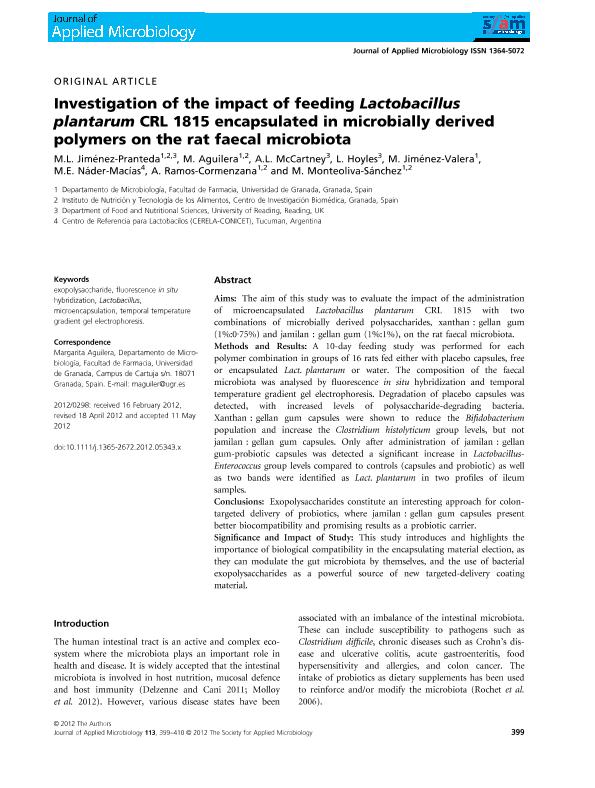Mostrar el registro sencillo del ítem
dc.contributor.author
Jiménez Pranteda, María Luján
dc.contributor.author
Aguilera, Margarita
dc.contributor.author
Mc Cartney, Anne
dc.contributor.author
Hoyles, Lesley
dc.contributor.author
Jiménez-Valera, Maria
dc.contributor.author
Nader, Maria Elena Fatima

dc.contributor.author
Ramos Cormenzana, Alberto
dc.contributor.author
Monteoliva Sánchez, Mercedes
dc.date.available
2017-09-22T14:05:52Z
dc.date.issued
2012-08
dc.identifier.citation
Jiménez Pranteda, María Luján; Aguilera, Margarita; Mc Cartney, Anne; Hoyles, Lesley; Jiménez-Valera, Maria; et al.; Investigation of the impact of feeding Lactobacillus plantarum CRL 1815 encapsulated in microbially derived polymers on the rat faecal microbiota; Wiley Blackwell Publishing, Inc; Journal of Applied Microbiology; 113; 2; 8-2012; 399-410
dc.identifier.issn
1364-5072
dc.identifier.uri
http://hdl.handle.net/11336/24915
dc.description.abstract
AIMS: The aim of this study was to evaluate the impact of the administration of microencapsulated Lactobacillus plantarum CRL 1815 with two combinations of microbially derived polysaccharides, xanthan : gellan gum (1%:0·75%) and jamilan : gellan gum (1%:1%), on the rat faecal microbiota.
METHODS AND RESULTS: A 10-day feeding study was performed for each polymer combination in groups of 16 rats fed either with placebo capsules, free or encapsulated Lact. plantarum or water. The composition of the faecal microbiota was analysed by fluorescence in situ hybridization and temporal temperature gradient gel electrophoresis. Degradation of placebo capsules was detected, with increased levels of polysaccharide-degrading bacteria. Xanthan : gellan gum capsules were shown to reduce the Bifidobacterium population and increase the Clostridium histolyticum group levels, but not jamilan : gellan gum capsules. Only after administration of jamilan : gellan gum-probiotic capsules was detected a significant increase in Lactobacillus-Enterococcus group levels compared to controls (capsules and probiotic) as well as two bands were identified as Lact. plantarum in two profiles of ileum samples.
CONCLUSIONS: Exopolysaccharides constitute an interesting approach for colon-targeted delivery of probiotics, where jamilan : gellan gum capsules present better biocompatibility and promising results as a probiotic carrier.
SIGNIFICANCE AND IMPACT OF STUDY: This study introduces and highlights the importance of biological compatibility in the encapsulating material election, as they can modulate the gut microbiota by themselves, and the use of bacterial exopolysaccharides as a powerful source of new targeted-delivery coating material.
dc.format
application/pdf
dc.language.iso
eng
dc.publisher
Wiley Blackwell Publishing, Inc

dc.rights
info:eu-repo/semantics/openAccess
dc.rights.uri
https://creativecommons.org/licenses/by-nc-sa/2.5/ar/
dc.subject
Exopolysaccharide
dc.subject
Fluorescence in Situ Hybridization
dc.subject
Lactobacillus
dc.subject
Microencapsulation
dc.subject
Temporal Temperature Gradient Gel Electrophoresis
dc.subject.classification
Bioquímica y Biología Molecular

dc.subject.classification
Ciencias Biológicas

dc.subject.classification
CIENCIAS NATURALES Y EXACTAS

dc.title
Investigation of the impact of feeding Lactobacillus plantarum CRL 1815 encapsulated in microbially derived polymers on the rat faecal microbiota
dc.type
info:eu-repo/semantics/article
dc.type
info:ar-repo/semantics/artículo
dc.type
info:eu-repo/semantics/publishedVersion
dc.date.updated
2017-07-26T15:25:23Z
dc.identifier.eissn
1365-2672
dc.journal.volume
113
dc.journal.number
2
dc.journal.pagination
399-410
dc.journal.pais
Reino Unido

dc.journal.ciudad
Oxford
dc.description.fil
Fil: Jiménez Pranteda, María Luján. Universidad de Granada; España. Centro de Investigación Biomédica. Instituto de Nutrición y Tecnología de los Alimentos; España. University Of Reading; Reino Unido
dc.description.fil
Fil: Aguilera, Margarita. Universidad de Granada; España. Centro de Investigación Biomédica. Instituto de Nutrición y Tecnología de los Alimentos; España
dc.description.fil
Fil: Mc Cartney, Anne. University Of Reading; Reino Unido
dc.description.fil
Fil: Hoyles, Lesley. University Of Reading; Reino Unido
dc.description.fil
Fil: Jiménez-Valera, Maria. Universidad de Granada; España
dc.description.fil
Fil: Nader, Maria Elena Fatima. Consejo Nacional de Investigaciones Científicas y Técnicas. Centro Científico Tecnológico Conicet - Tucuman. Centro de Referencia Para Lactobacilos; Argentina
dc.description.fil
Fil: Ramos Cormenzana, Alberto. Universidad de Granada; España. Centro de Investigación Biomédica. Instituto de Nutrición y Tecnología de los Alimentos; España
dc.description.fil
Fil: Monteoliva Sánchez, Mercedes. Universidad de Granada; España. Centro de Investigación Biomédica. Instituto de Nutrición y Tecnología de los Alimentos; España
dc.journal.title
Journal of Applied Microbiology

dc.relation.alternativeid
info:eu-repo/semantics/altIdentifier/doi/http://dx.doi.org/10.1111/j.1365-2672.2012.05343.x
dc.relation.alternativeid
info:eu-repo/semantics/altIdentifier/url/http://onlinelibrary.wiley.com/doi/10.1111/j.1365-2672.2012.05343.x/abstract
Archivos asociados
